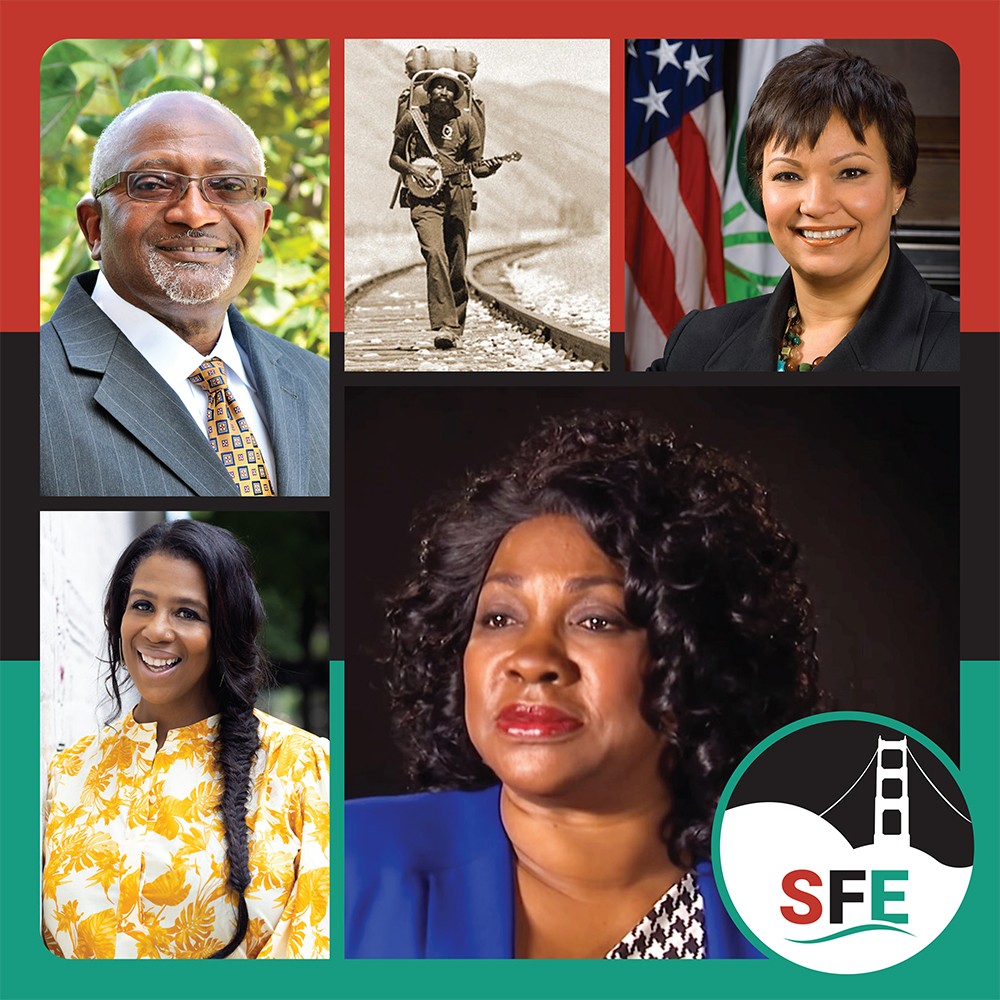
Black environmentalists are integral leaders in conservation and environmental activism. Their profound contribution cannot be understated, though it has often gone unrecognized. The formation of this list is in part an attempt to address that erasure.
The individuals listed below, among many others, have helped shape the American landscape and continue to inspire future generations of environmental stewards. Their work underscores the importance of diversity and representation in the field of climate action. It is not comprehensive nor finite; SF Environment has developed this list alongside community partners and we welcome your input.
LaTricea Adams
LaTricea Adams is the Founder CEO & President of Black Millennials for Flint. An educational leader with the ability to increase student achievement through research-based, data-driven practices. Possesses experience working with diverse populations—students, staff, and community members, including schools with large minority groups and significant economic variance. She is also part of the White House Environmental Justice Advisory Council.
Will Allen
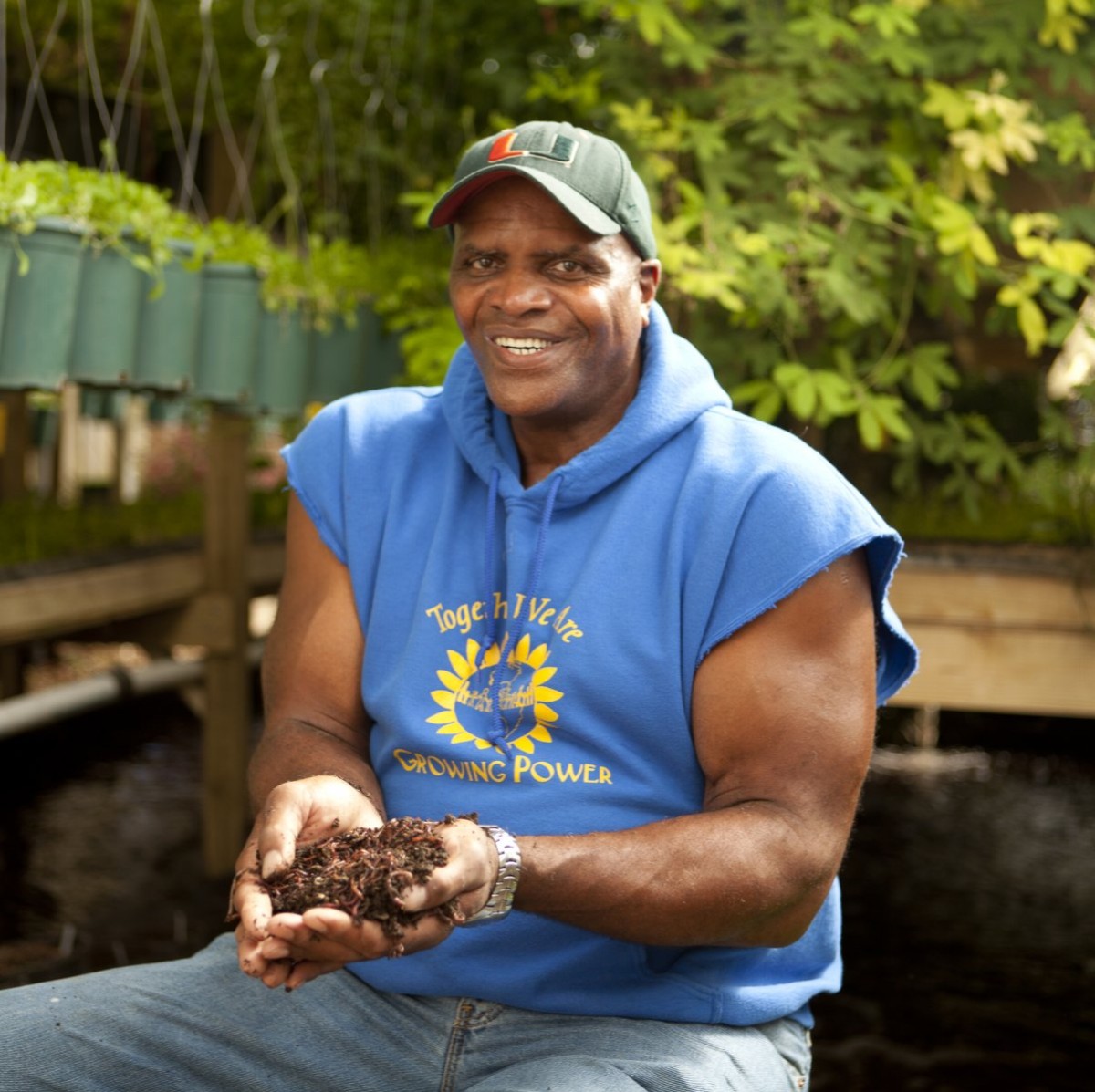
Will Allen is the son of a sharecropper, former professional basketball player, ex-corporate sales leader and now farmer. The founder and CEO of Growing Power Inc., he has become recognized as one of our preeminent thinkers on agriculture and food policy and is a leading authority in the expanding field of urban agriculture. Allen promotes the belief that all people, regardless of their economic circumstances, should have access to fresh, safe, affordable and nutritious foods. Using methods he has developed over a lifetime, Allen specializes in bringing healthy food to under-served communities using a unique growing system he developed himself.
He trains community members to become community farmers, assuring them a secure source of good food without regard to political or economic forces. What started as a simple partnership to change the landscape of the north side of Milwaukee has blossomed into a national and global commitment to sustainable food systems. In 2008, Allen was awarded a prestigious John D. and Katherine T. McArthur Foundation Fellow “genius grant” for his work – only the second farmer ever to be so honored. In May 2010, Time magazine named Allen one of the World’s 100 Most Influential People. Photo credit: Jennifer Baynes Picciolo.
Ibrahim Abdul-Matin
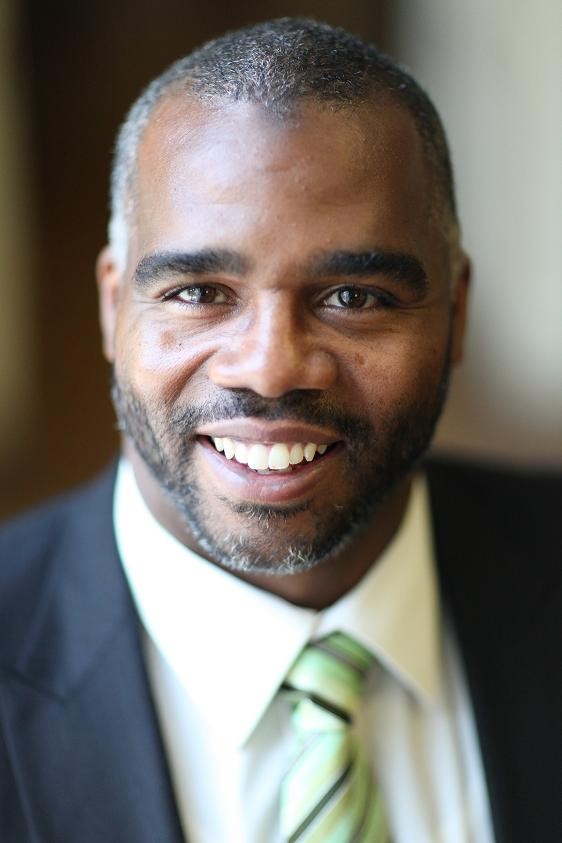
Ibrahim Abdul-Matin is a former adviser to Michael Bloomberg specializing in the field of environmental sustainability. On his blog, he says, “I was inspired to become a steward of the Earth when my father took me from the concrete jungle that is Brooklyn to Bear Mountain, a hiker’s paradise. I was five years old. I recall moss growing on rocks, mushrooms on rotting wood, and a freshness in the air. When it was time for the afternoon prayer, my father stopped to pray. I was used to praying at home or praying in a mosque. That day, my father told me, ‘The Earth is a Mosque. You can pray anywhere.’ From that moment on, I knew, if I could pray anywhere, then everywhere was sacred. It was my duty to protect the planet, to be a steward of the Earth.”
Abdul-Matin is the author of the book: Green Deen: What Islam Teaches About Protecting The Planet.
Mustafa Santiago Ali
Mustafa Santiago Ali is the Executive Vice President of the National Advocacy Center.
A renowned thought leader, international speaker, policy maker, community liaison, trainer, and facilitator, Dr. Mustafa Santiago Ali serves as the Executive Vice President for the National Wildlife Federation. He is also the founder of Revitalization Strategies, a business focused on moving our most vulnerable communities from “surviving to thriving.”
Before joining the National Wildlife Federation, Mustafa was the Senior Vice President for the Hip Hop Caucus, a national non-profit and non-partisan organization that connects the hip-hop community to the civic process to build power and create positive change. In his role, he led the strategic direction, expansion, and operation of the Hip Hop Caucus’ portfolio on climate, environmental justice, and community revitalization.
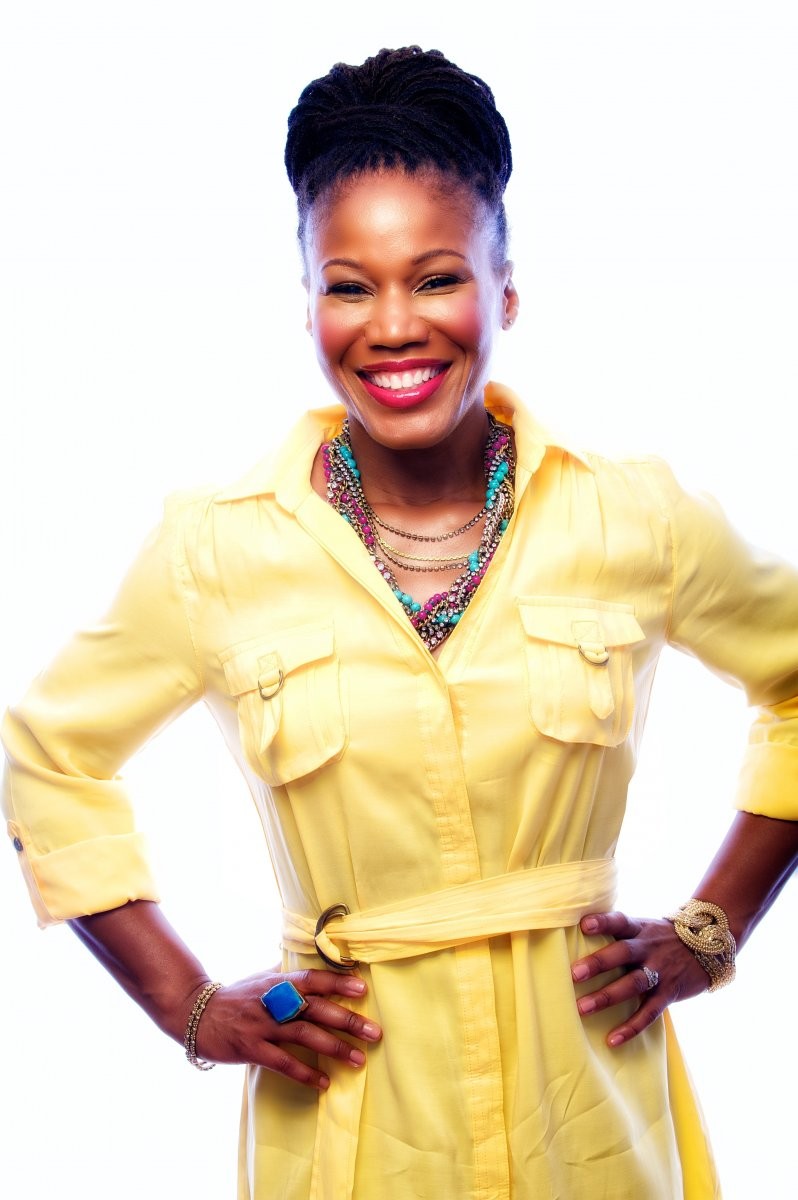
Majora Carter Photo credit: MDavidLeeds.com
Carl Anthony
Carl Anthony has spent his career working to solve social justice problems. His two passions are the battle for justice for people at the bottom of the economic ladder--particularly people of color—and working for an economy that is environmentally sustainable. He has been instrumental in expanding the environmental movement to include those most vulnerable to the impacts of climate change. He is the founder of the Urban Habitat Program, one of the oldest environmental justice organizations in the country, and is the former head of Earth Island Institute. He also started the only environmental justice periodical in the United States: Race, Poverty and the Environment Journal.
William J. Barber III
William J. Barber III is the Director of Equitable Investment and Energy Justice at The Coalition for Green Capital. William is a renewable energy professional, with a history of environmental and climate justice scholarship and advocacy. Possessing over a decade of social justice organizing experience and deep academic training in the history, science, and law behind environmental and climate issues, William is committed to connecting policymakers, grassroots leaders, faith leaders, and corporations to ensure we are collaborating on climate solutions that are equitable for all.
View William J. Barber III's bio on the Coalition for Green Capital's website.
MaVynee Oshun Betsch (1935-2005)
MaVynee Oshun Betsch was an environmental activist known as “The Beach Lady” for her tireless conservation efforts on behalf of Florida’s coastal environment. With her seven-foot long dreadlocks and colorful dress, Betsch made for an impressive figure and was hard to ignore. While she was raised in luxury, she gave away her entire fortune to environmental causes. She was posthumously honored as an Unsung Hero of Compassion by the Dalai Lama in 2005.
Solomon G. Brown (1829-1906)
Solomon G. Brown was the first African-American employee at the Smithsonian Institution, working continuously from 1852 until 1906. He held a number of roles during his 54-year tenure, including preparing maps and drawings for lectures and working in the International Exchange Service. Brown was also self-educated and obtained considerable knowledge in the field of natural history while at the Smithsonian. He became well known for his illustrated lectures on natural history and lectured frequently at scientific societies throughout the Washington, DC area.
Dr. Robert Bullard
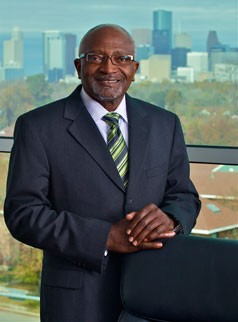
Dr. Robert Bullard is often referred to as the “father of the environmental justice movement.” He has been one of the leading voices on the issue for decades. In 2008, he was named one of Newsweek’s 13 “Environmental Leaders of the Century." In 2013, he was the first African American to be honored with the Sierra Club John Muir Award.
Dr. Bullard has authored numerous books on the prominence of waste facilities in predominately African-American areas all over the nation, as well as others that address urban land use, industrial facility siting, housing, transportation, climate justice, emergency response, smart growth, and equity. When asked what keeps him going in his quest for environmental justice, Bullard answers, "People who fight... People who do not let the garbage trucks and the landfills and the petrochemical plants roll over them. That has kept me in this movement for the last 25 years." Another thing he believes is that if you live on this earth, if you breathe this air, then you are an environmentalist.
Ambrose Carroll Sr.
Reverend Dr. Ambrose F. Carroll, Sr., is the Founder and CEO of Greenthechurch.org, which is the largest repository and catalyst for the environmental and sustainability movement built for and by the Black Church. He is the President at Large of the California State Baptist Convention and is a Senior Fellow with the Atlantic Fellows for Racial Equity. Dr. Carroll sits on the steering committee for the West Oakland Community Action Plan and is a member of the Environmental Justice Committee for the California Air Resources Board. Dr. Carroll earned a B.A. in Psychology from Florida Memorial University in Miami, FL, a Master of Divinity from Morehouse School of Religion in Atlanta, GA, a Master of Business Administration from Golden Gate University in San Francisco, CA, and a Doctor of Divinity from United Theological Seminary in Dayton, Ohio. Rev. Carroll is married to the former Mrs. Katresa Williams, and they have three children.
Learn more on Dr. Carroll's bio page on the Green Church's website.
Majora Carter

Majora Carter is an internationally-recognized urban revitalization strategy consultant, real estate developer, and Peabody Award winning broadcaster who views urban renewal through an environmental lens. The South Bronx native draws a direct connection between ecological, economic, and social degradation. With her inspired ideas and fierce persistence, Carter managed to bring the South Bronx its first open-waterfront park in 60 years. She was one of the first of six speakers on the prestigious TEDTalks series. Carter's confidence, energy, and intensely emotional delivery make her talks themselves a force of nature. In 2005, Carter was awarded a 2005 John D. and Katherine T. McArthur Foundation Fellow "genius" grant. Her company, the Majora Carter Group, is putting the green economy and green economic tools to use, unlocking the potential of every place -- from urban cities and rural communities, to universities, government projects, businesses and corporations -- and everywhere else in between.
Photo credit: MDavidLeeds.com
George Washington Carver (1864-1943)
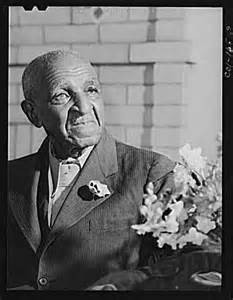
George Washington Carver is regarded as one of America's greatest agricultural researchers and educators. His innovations in the field of crop rotation are considered breakthroughs in resource conservation, by preserving soil and making farms more productive. Carver may have been one of the first scientists to look at systems through the lens of biomimicry; he observed that nature produces no waste--what is consumed is returned to the whole in another usable form.
As we are coming to understand 150 years later, Carver believed that in the natural world, everything is a part of the whole. He understood that nothing exists in isolation, everything is inextricably connected, and that ignoring that fact can have disastrous effects. An intensely spiritual man, Carver believed that God spoke through the beauty of nature and the joy of creating. He taught that any action must be considered in light of its overall long-term consequences, not just its immediate benefits. In 1941, Time magazine dubbed Carver the “Black Leonardo." Photo credit: Library of Congress
Dr. Denise Fairchild
Dr. Denise Fairchild is the President Emeritus of Emerald Cities Collaborative. Dr. Fairchild focuses on building community-led partnerships with labor, environmental and business organizations to increase energy efficiency, clean energy, sustainable foods and clean water with a focus on low-income and communities of color.
View Denise's bio page on the Emerald Cities Collaborative website.
John Francis
"Part of the mystery of walking is that the destination is inside us and we really don't know when we arrive until we arrive"
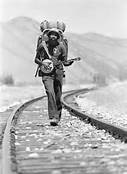
John Francis is known to all as the Planet Walker.
After witnessing a massive oil spill in San Francisco Bay in 1971, Francis gave up all motorized transportation. For 22 years, he walked everywhere he went -- including treks across the entire United States and much of South America -- hoping to inspire others to rethink the petroleum economy. As Francis traveled about on foot, he often found himself arguing with others about his decision, which led him to an even more radical decision: to stop speaking for one day and instead listen to what others had to say. This turned into a 17-year vow of silence. His charm and ingenious ability to communicate without talking earned him bachelor’s, master’s and doctorate degrees. The day after he ended his vow of silence on Earth Day 1990, he was struck by a car, but still managed to convince the ambulance crew to allow him to walk to the hospital. In 1991, Francis was named a United Nations Environmental Program Goodwill ambassador.
"Part of the mystery of walking is that the destination is inside us and we really don't know when we arrive until we arrive," he said. He is the author of: Planetwalker: 22 Years of Walking, 17 Years of Silence.
Photo credit: Glenn Oakley
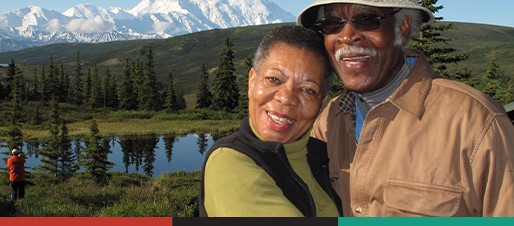
Audrey and Frank Peterman
Kari Fulton
Kari Fulton comes from the school of thought that everything you do is connected to the environment in some capacity. She calls her generation “Generation Why Not?” and works to mobilize them by building awareness of the connection between environmental and social justice issues. She led the youth campaign for the Environmental Justice and Climate Change (EJCC) initiative of the United Nations and co-founded "Loving Our City, Loving Ourselves," a campus and community initiative that builds solidarity on issues of concern. In her capacity at EJCC, Fulton trains hundreds of young people at more than 50 universities, particularly students of color at historically Black colleges, about the importance of building a green movement. Noted as a young leader to watch by Elle and Glamour magazine, Fulton co-founded Checktheweather.net, a national online community and web platform to amplify the voices of young people of color advocating for environmental justice.
Dr. Diane Glave
Dr. Diane Glave is a historian and professor whose specialty is African American Environmentalism. Her love of nature has translated professionally and vocationally, and she writes and speaks extensively on the topic. She is currently serving as the associate pastor at Ingomar Church in Pittsburgh, where part of her ministry is advocacy for impoverished and marginalized people affected by environmental disparity including access to recreational spaces and healthcare. She is the author of “Rooted in the Earth: Reclaiming the African American Environmental Heritage.”
Marie Harrison (1948 – 2019)
Marie Harrison was a leader in the environmental justice movement in Bayview. She came to San Francisco in 1966 with her family and began working at the Hunter’s Point Naval Shipyard as a teenager. She and her family experienced disproportionate exposure to environmental hazards and subsequently endured negative health impacts as a result. She fought tirelessly to address these injustices.
Marie was integral in the fight to close the PG&E power plant, which was demolished in 2009. For many years she was a community organizer and board member for Greenaction for Health and Environmental Justice. In June 2018, she was honored for a lifetime of activism by the SF Board of Supervisors. She passed away in May 2019, fighting for her community until the very end.
Her legacy of environmental justice and advocacy is still felt today and carried on by her daughter, Arieann Harrison, founder and Executive Director of Marie Harrison Community Foundation, Inc.
Savonala Horne
Savonala Horne is a leading advocate for minority landowners and financially distressed farmers trying to preserve their farms, homes, land and rural livelihoods—as many are victims of an environmental racism that forces people off the land. As the Executive Director of North Carolina’s Land Loss Prevention Project, she coordinates free legal and technical assistance and provides strategic guidance in litigation involving discrimination in the agricultural and environmental arenas. Ms. Horne was involved in the development and coordination of minority and limited-resource farmers' and farmworkers' interests in the 2007-08 U.S. Farm Bill. She continues to be involved in that process and advocates for improvements in the U.S. Farm Bill that address specific concerns of socially disadvantaged farmers and ranchers.
Quentin James
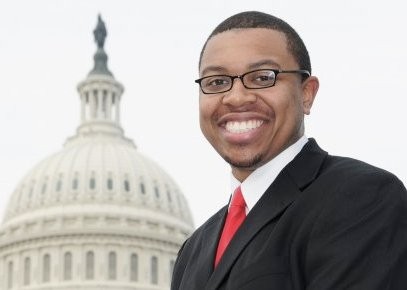
Quentin James is the former National Director for the Sierra Club's Sierra Student Coalition, the nation’s largest youth environmental organization. James directed the organization to train, empower, and organize youth to run effective campaigns that resulted in tangible environmental victories and developed leaders for the environmental movement. James’ environmental tipping point was an internship focused on researching Detroit's history as a fresh food desert. The project introduced him to environmental justice and the need to create a new profile of what an environmental activist looks like.
Dr. Espanola Jackson (1933 – 2016)
Dr. Espanola Jackson was a highly respected and influential figure in San Francisco who dedicated her life to improving her community and fighting for the civil rights of all law-abiding citizens for over 50 years. Her efforts significantly contributed to the development of a strong, Black, wholesome, solid, family-oriented community in San Francisco.
In addition to her work in the community, she was also a respected national leader in the Energy Democracy movement. She worked to shut down the PG&E Hunters Point Power Plant and mobilized against a tar-sands dirty crude expansion of the Chevron Richmond oil refinery. Espanola Jackson was one of the key community activists who originally founded the Southeast Community Center. This center was established as part of an agreement to offset the effects of the Southeast Wastewater Treatment Plant on surrounding communities. The agreement was the result of strong activism in Bayview-Hunter’s Point communities and serves as an inspiring example of civic leadership and advocacy.
Lisa Jackson
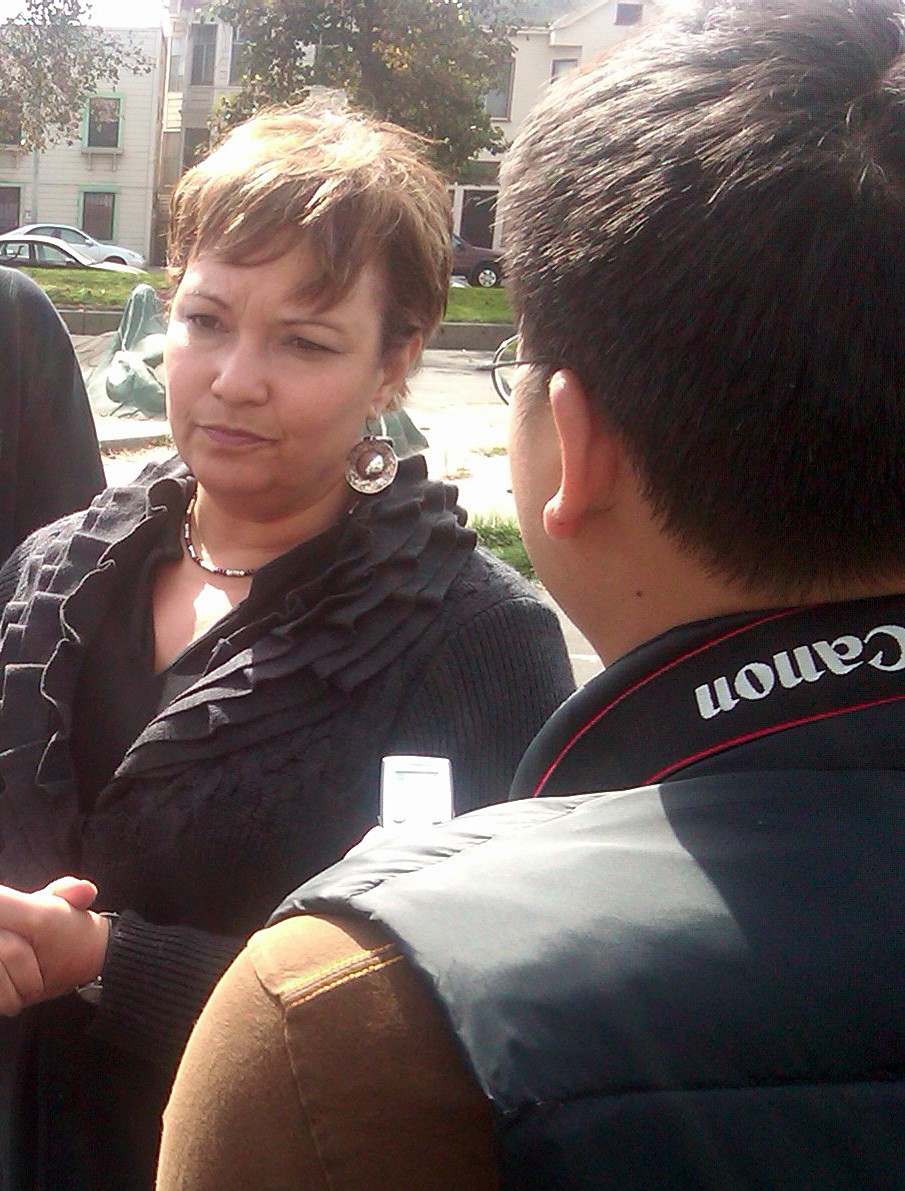
Lisa Jackson was the first African American (and one of only a few women) to serve as the federal EPA Administrator. Appointed by President Obama in 2009, she made it a priority to focus on vulnerable groups – including children, the elderly, and low-income communities – that are particularly susceptible to environmental and health threats. Jackson became interested in environmental matters following the national and international coverage of the Love Canal Disaster in the mid-1970s. She led the EPA to expand its commitment to engaging with and listening to all stakeholders in the decision-making process. After leaving the EPA, in May 2013, Jackson joined Apple as their environmental director.
Photo credit: EPA
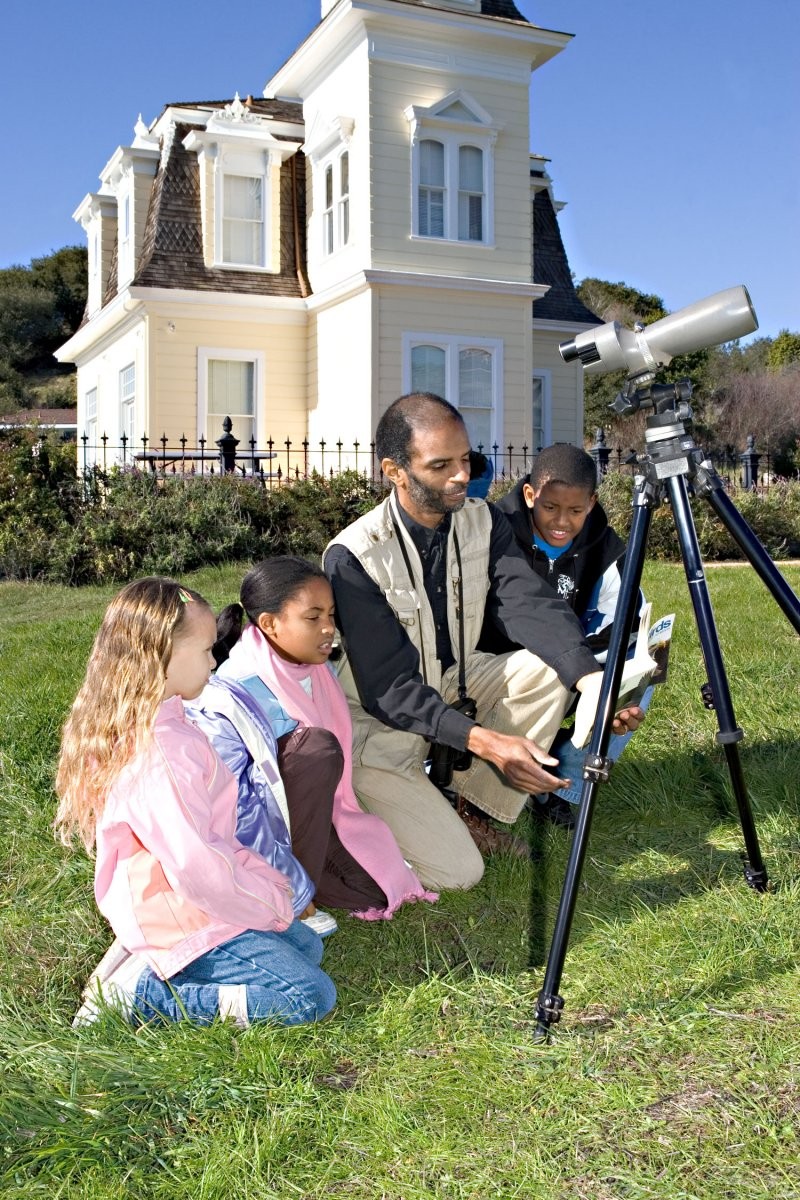
John C. Robinson Photo credit: James D. Northey
Dr. Ayana Elizabeth Johnson
Dr. Ayana Elizabeth Johnson is a marine biologist, policy expert, writer, and conservation strategist. She is the co-founder of Urban Ocean Lab, a think tank for ocean-climate policy in coastal cities. She also co-edited the bestselling climate anthology All We Can Save, co-founded The All We Can Save Project, and co-created the Spotify/Gimlet climate solutions podcast. Dr. Johnson has conducted research on urban ocean conservation, sustainable fishing, ocean zoning, climate change, and social justice.
Shelton Johnson
Shelton Johnson, a native of Detroit, Michigan, earned a B.A. in English Literature from the University of Michigan in 1981. He served in the Peace Corps in Liberia, West Africa. In 1987, Johnson began his career as a park ranger for the National Park Service (NPS). He has worked in Yellowstone, Washington, D.C., Great Basin, and, for the last twenty years, in Yosemite National Park. He was a member of the second NPS delegation to mainland China and has been twice nominated for the National Freeman Tilden Award, the highest award for Interpretation in the NPS. He won the national award in 2009. Johnson was an advisor to and an on-camera commentator for Ken Burns' PBS documentary film, "The National Parks, America's Best Idea," which first aired in 2009. There was a special screening of this film at the White House that year where Johnson met and spoke with President Obama. In 2010, Ranger Johnson invited and hosted Oprah Winfrey on her first visit to Yosemite National Park. This trip comprised two episodes of the final season of her talk show, which was also broadcast in over 150 countries. The latter effort was made in order to encourage African Americans to claim their inheritance as owners of our national parks. For over ten years Johnson has performed in Yosemite Valley as Sergeant Elizy Boman in the play "Yosemite Through the Eyes of a Buffalo Soldier." That play has become a 60-minute PBS film, which will premiere in Yosemite Valley on Saturday, March 1st in the inaugural "Range of Light Film Festival." It will air on the PBS TV/Fresno affiliate on March 11th. Johnson is the author of the historical novel Gloryland, which was published by the Sierra Club in 2009. This novel, which chronicles the life of a Black Indian from South Carolina who eventually served as one of Yosemite's Buffalo Soldiers, is the first novel by an African American to be published by Sierra Club Books.
Marc Bamuthi Joseph
Marc Bamuthi Joseph is an arts activist who created "red, black & GREEN: a blues(rbGb)" in response to the fact that people of color are underrepresented in the environmental movement. This multimedia performance work jumpstarts a conversation about environmental justice, social ecology, and collective responsibility in the climate change era. Performed throughout the country, rbGb provided a vibrant opportunity to unite individuals, families, and neighbors in asking, "what sustains life in OUR community?" and gave voice to those people often left out of discussions about "living green." The play is an outgrowth of Bamuthi’s Life is Living, a national series of one-day festivals designed to activate under-resourced parks and affirm peaceful urban life through hip hop arts and focused environmental action. “I want to engage the question of environment, specifically in black and brown communities, in a different kind of way,” Bamuthi explains. “The process of working in environment really illuminates how isolated and compartmentalized the green sector is, specifically in its messaging.” In fall 2007, he appeared on the cover of Smithsonian Magazine.
Rue Mapp
Rue Mapp is a renowned leader, speaker, and public lands champion. She is the founder and CEO of Outdoor Afro, a national not-for-profit organization that celebrates and inspires Black connections and leadership in nature. The organization, which Rue founded as a social enterprise in 2009, is headquartered in Oakland, California. It has grown to include more than 100 trained volunteer leaders across the United States.
Rue grew up in a hunting and fishing family on a Northern California ranch. Recently, she has returned to this lifestyle, participating in hunts for various game. In addition to her work with Outdoor Afro, Rue has also collaborated with outdoor retailer REI Co-op and CLIF®.
In November 2022, Rue published her first national book titled “Nature Swagger: Stories and Visions of Black Joy in the Outdoors."
Sophie Maxwell
Sophie Maxwell is a former electrician who served three terms on the San Francisco Board of Supervisors representing southeast neighborhoods in San Francisco. The San Francisco native grew up surrounded by political activism. That spirit, along with her motherly intuition to make things better for her son and others in her neighborhood, helped get her elected. During her tenure, she worked for more equitable distribution of public resources, increasing economic development opportunities for all San Franciscans, and nurturing and empowering the city's most vulnerable residents. Sophie continues to advocate for environmental justice, clean energy, and children's health and educational programs. Along with many other activists, Maxwell was instrumental in the successful effort to close the Hunters Point power plant, one of the oldest and dirtiest in the state.
John W. Mitchell
John W. Mitchell, a member of the North Carolina Agriculture & Technology University Agriculture Hall of Fame, started out by serving farmers in three North Carolina counties through the state agricultural extension service just after World War I. He traveled three counties exclusively by bicycle or horseback and organized the Eastern Columbus Credit Union to help African-American farmers save money by buying their supplies together in bulk. His expertise in progressive farming techniques led to his appointment as director of African-American extension services for the entire South for the U.S. Department of Agriculture during the late 1940s.
Jacqueline Patterson
Jacqueline Patterson is the former NAACP Environmental and Climate Justice Program director and the current executive director of the Shirley Chisolm Legacy Project. This organization supports and develops Black women in climate change and environmental justice. During her tenure, she founded and implemented a robust portfolio, which included serving the state and local leadership whose constituencies consisted of hundreds of communities on the frontlines of environmental injustice.
Visit Jacqueline's bio page on the Chisolm Legacy Project's website.
Audrey and Frank Peterman
Audrey and Frank Peterman are among the leading experts on America’s publicly-owned lands system and have been pioneers in the green and conservation movement since 1995. They are tenacious advocates for breaking the color barrier and for integration of our natural treasures as a way for all Americans, including children, youth, adults and seniors - regardless of ethnic heritage - to better appreciate our collective history and achieve a truly democratic society. The captivating story of the Peterman’s journey through the national parks and the environmental world enables Americans to look at our country with new eyes. It shows that around the country, Americans of every race contributed to the protection of our most treasured places. They are co-authors of the book Legacy on the Land: A Black Couple Discovers Our National Inheritance and Tells Why Every American Should Care.
Marjorie Richard
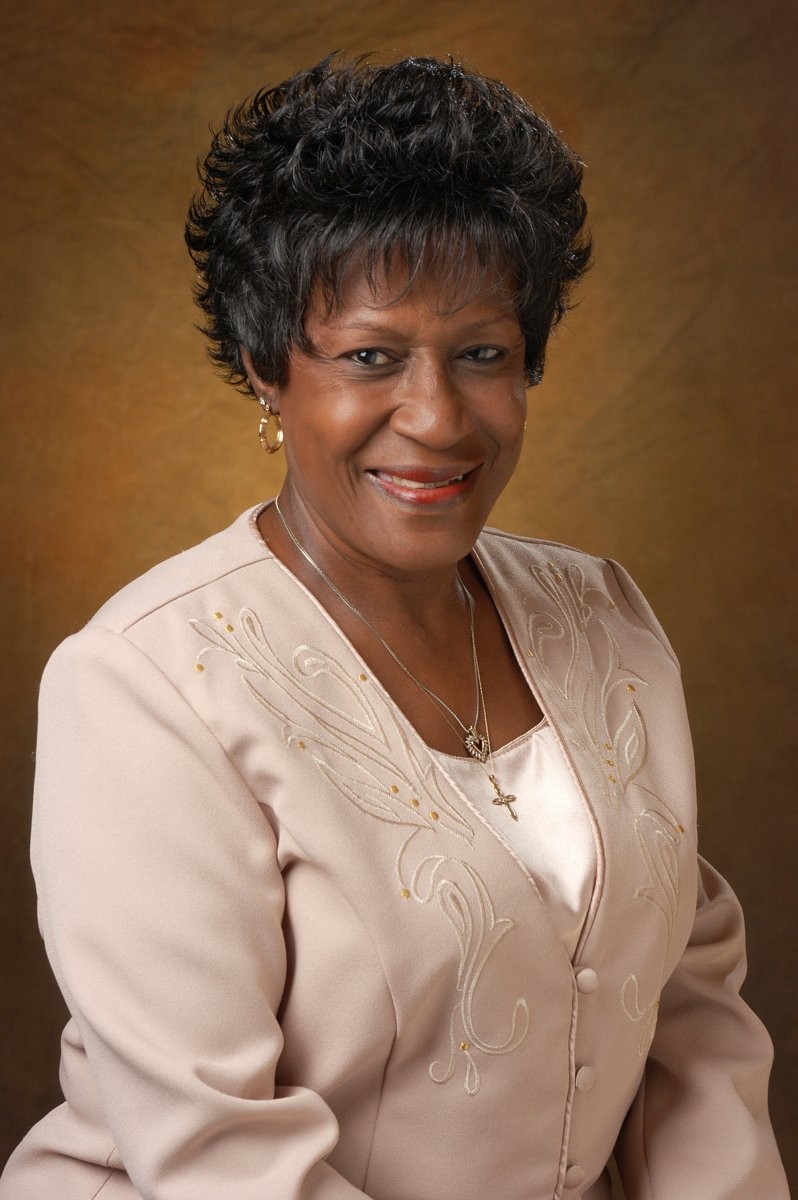
Marjorie Richard is the first African-American to win the Goldman Environmental Prize. Growing up in a historically African American neighborhood in Norco, Louisiana, Richard was painfully aware of the devastating health problems her community faced as a result of the Shell refinery next door. According to Richard, the defining moment which convinced her to become an activist occurred in 1973, when a Shell pipeline exploded, knocking one house off its foundation and killing an elderly woman and a teenage boy who was mowing the lawn. Years later, she led the front line of a long, hard-won battle to hold Shell accountable. A master of political theater, Richard installed a Web camera in her trailer home to broadcast live feeds of the refinery spewing petrochemical byproducts. While speaking at an international environmental conference, Richard approached Shell officials and invited them to take a sniff from a bag of Norco air. Photo credit: Goldman Environmental Prize

Marjorie Richard
Jerome Ringo
Jerome Ringo is president of the Apollo Alliance, a coalition of organized labor, environmentalist, business and civil rights leaders dedicated to freeing the United States of dependence on foreign oil. "We are an organization that looks like the face of America," Ringo has said. A life-long groundbreaker, Ringo became the first African American in history to chair a major conservation advocacy organization, the National Wildlife Federation. He was the only African American delegate at the 1998 Global Warming Treaty negotiations in Japan.
Ringo’s experience as a union leader in the petrochemical industry solidified his commitment to environmental justice. Many of his relatives lived just beyond the fence from these industries, and he saw the impacts first-hand. He noted that employees at the refineries wore masks and protective clothing, but that the neighbors across the fence, who were predominantly poor and Black, received no such protection, and suffered disproportionately high levels of cancers and respiratory diseases.
John C. Robinson

John C. Robinson is a biologist and birder who has birded in almost every state and led birding trips in Central America and South Africa. But wherever he goes, he says, he often hears the same comment: “I’ve never met a black bird watcher before!” Eventually, it got him wondering why there were so few minorities involved with birding – so he decided to do something about it. Robinson often points out that in another couple of generations, minority populations collectively will be the majority and will hopefully drive conservation efforts. Thus, his mission is to encourage inner city and minority youth and young adults to become more interested in nature through bird watching. He explores the topic in his book, Birding for Everyone: Encouraging People of Color to Become Birdwatchers.
Photo credit: Copyright (c) 2007 James D. Northey
Nicky Sheats
Nicky Sheats is the director of the Center for the Urban Environment at Thomas Edison Sate College where he provides support for New Jersey’s environmental justice community. Among the issues he is working on are particulate matter air pollution, climate change, the siting of schools on contaminated land, and increasing the capacity of the environmental justice community to address these and other issues. He is serving on the national NAACP’s Environmental and Climate Justice Advisory Panel.
Dr. Dorceta Taylor
Dr. Dorceta Taylor is a professor of environmental sociology at the University of Michigan and the coordinator of its Environmental Justice Field of Studies. Her research focuses on history of mainstream and environmental justice ideology and activism, social movements and framing, green jobs, diversity in the environmental field, urban agriculture, and food justice. She has convened several symposia to discuss diversity in the environmental field. Dr. Taylor is the Chair of the American Sociological Association’s Environment and Technology Section and the author of The Environment and the People in American Cities: 1600s-1900s. Disorder, Inequality, and Social Change.
Bryant Terry
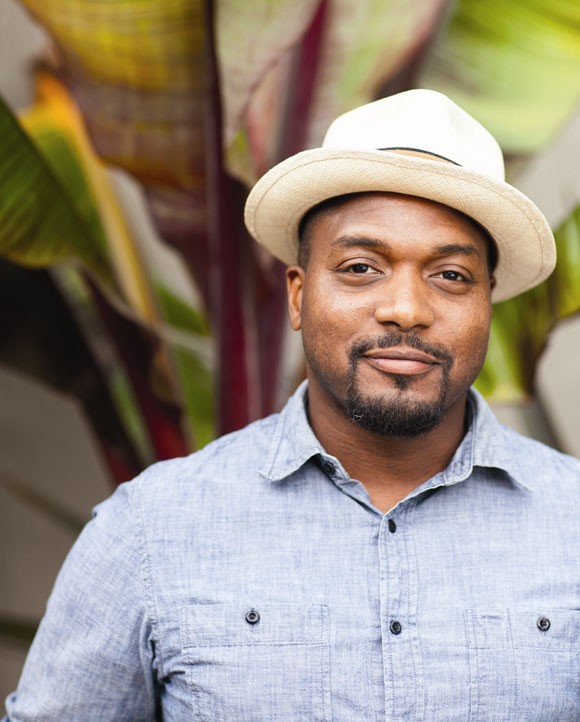
Bryant Terry is a chef, food justice activist, and author of four books, including one on vegetarian soul food. He is committed to raising awareness about the negative impact the industrial food system has on health and the environment. Terry’s interest in cooking, farming, and community health can be traced back to his childhood in Memphis, Tennessee, where his grandparents inspired him to grow, prepare, and appreciate good food. Bryant’s work has been featured in the New York Times, Food and Wine, Gourmet, Sunset, O: The Oprah Magazine, Essence, Yoga Journal, and Vegetarian Times, among many other publications. In 2012, Terry was chosen by the U.S. State Department as one of 80 American chefs to be a part of its new American Chef Corps. Photo credit: Paige Green
Michael Twitty
Michael Twitty is a food writer and culinary historian who focuses on African American food culture. He joined forces with the oldest seed house in the country to begin a collection of culinary plants, dating back to the agricultural contributions of slaves in America. These seeds and plants serve as a way to pay homage to African American ancestors who focused on tilling the ground. He promotes African American foodways not only to honor the Ancestors, but to provide a lifeline to contemporary communities and people of color looking for a better life and a way out of the health and chronic illness crisis, and a way to reduce the vast food deserts that plague many of our communities. To honor the food past and provide for the food future is what Michael calls “culinary justice.”
Warren Washington
Warren Washington is an internationally recognized expert in atmospheric sciences and climate research, specializing in computer modeling of the Earth's climate. As the second African American to earn a doctorate in the atmospheric sciences, Washington has served as a role model for generations of young researchers from many backgrounds. Among his many prestigious appointments, in 2009 he was elected to the National Academy of Engineering "for pioneering the development of coupled climate models, their use on parallel supercomputing architectures, and their interpretation." He won the 1997 U.S. Department of Energy Biological and Environmental Research Program Exceptional Service Award for Atmospheric Science for the development and application of advanced coupled atmospheric-ocean general circulation models to study the impacts of human activities on future climate. Washington's computer models for studying the impacts of climate change in the 21st century were used extensively in the 2007 Intergovernmental Panel on Climate Change assessment, for which National Center for Atmospheric Resources scientists, including Washington, and colleagues around the world shared the 2007 Nobel Peace Prize.
Dr. Beverly L. Wright
Dr. Beverly L. Wright is an environmental justice scholar and advocate, author, civic leader and professor. She is the founder of the Deep South Center for Environmental Justice, which addresses environmental and health inequities along the Mississippi River Chemical Corridor and is a community/university partnership providing education, training and job placement for underserved populations in environmental justice communities within the United States. After the devastation of Hurricane Katrina, the Center has focused its energies largely on research and policy efforts, community outreach and assistance as well as education and training of displaced African American and minority residents of New Orleans. In 2010, the Center’s activities on the education, training and public policy needs of those communities affected the BP Deep Water Horizon oil spill disaster. Most recently, she has extended the Center’s work to include communities affected by Hurricane Sandy. An accomplished author, she recently co-authored two books with Dr. Robert Bullard: Race, Place & the Environment After Hurricane Katrina and The Wrong Complexion for Protection: How the Government Response Endangers African-American Communities.